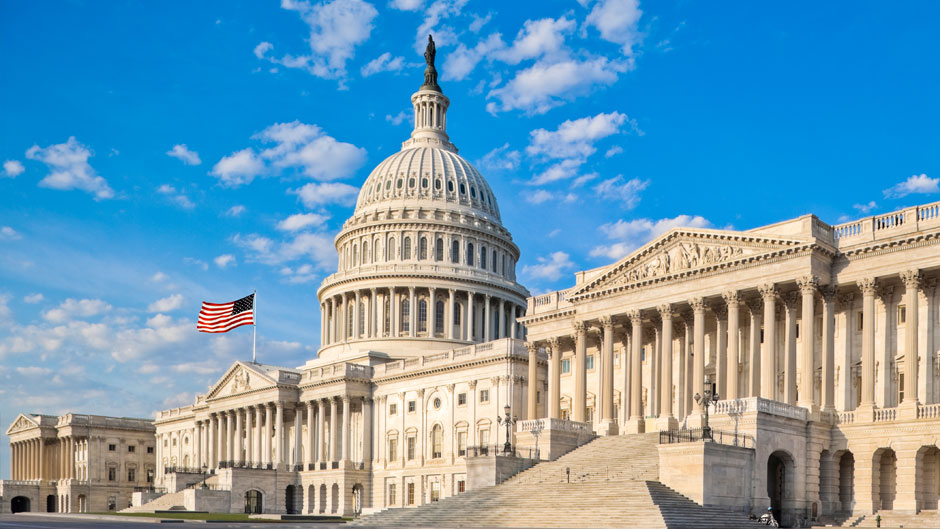Thought leaders, including former University of Miami president and congresswoman Donna Shalala, discussed priorities for the new Congress and the role of a moderate Senate coalition to facilitate legislative action, in a webinar hosted by the College of Arts and Sciences Department of Political Science.
Panelists Shalala and Molly Reynolds, a senior fellow with the Brookings Institute, joined moderator Gregory Koger, professor and chair of the Department of Political Science, in a webinar on Jan. 22 to share their insights on an expected course of action for the 117th Congress, Republican responses to those initiatives, and the contrasts in governing styles between the incoming and outgoing administrations.
With Democrats in the White House and controlling Congress, albeit it with the slimmest of margins in the Senate, Shalala said that new President Joseph Biden is eager to advance a wide range of legislative action such as immigration, foreign aid, the Affordable Care Act, and HR1, a composite bill that reforms campaign financing, ethics, and voting rights and requires vice presidents and presidents to disclose their tax returns.
The pandemic will preclude that, however, at least in the short term.
“It will be COVID, COVID, COVID, and we have to be resigned to that until we get enough vaccinations and contact tracing,” Shalala said. “They’ll want to get the economy going again, so they’ll start with the big $1.9 trillion package—the economic dimension of the stimulus—that the president wants.”
Next, the former congresswoman suggested the new administration would move to advance a massive green infrastructure bill—for traditional infrastructure improvements together with projects to address climate change—but must first seek to generate bipartisan support.
To that end, both Shalala and Reynolds highlighted the potential of the Common Sense Coalition, an informal group of relatively moderate senators spearheaded by Susan Collins, R-Maine, and Joe Manchin, D-West Virginia. The coalition worked together to end the government shutdown in 2018 and may be more influential in its new iteration.
“The goal is to have an ongoing set of senators from both parties who are willing to talk to each other and see where there might be areas of agreement,” Reynolds said. “Yet, for them to be consequential they have to be willing to use some of their own muscle—to hold out on certain issues to influence their party leadership.”
Koger suggested the coalition could have substantial impact.
“Maybe this coalition will be able to come up with compromises and everybody will vote for them and the Senate will be the way it used to be back in the ’80s and ’90s,” he said. “There was partisanship, but at the end of the day they would come across the aisle to do what it takes to move the country forward.”
Reynolds and Koger, who have both written books exploring the impact of the filibuster, discussed the potential use of that mechanism to stymie action in the new Congress together with other procedures—budget reconciliation and the congressional review—that facilitate legislative action within parameters.
Reynolds marked several contrasts between the new and outgoing administrations in terms of the dynamic between the White House and Congress. Biden’s own long tenure in the Senate and the extensive experience of his leadership team suggests that the new administration is “intimately familiar with how Congress works,” she said.
“Under the Trump administration, regulation that ultimately got struck down in court often did not go through the regulatory steps that the Administrative Procedures Act requires,” Reynolds said. “As we think of big-picture consequences, some of Biden’s regulatory efforts will be challenged but will be less likely to be struck down because the process wasn’t followed as required.”
Maria Amezquita of the College and Arts and Sciences fielded a range of questions from the webinar audience.
In answering a question about foreign aid to help developing countries with health, education, and economic opportunities, Shalala expressed her optimism.
“I’m very hopeful about foreign aid because first there is bipartisan support for it in both the House and Senate; and second, because now Democrats are handling aid in the Senate and there will be an active U.S. Agency for International Development director and an active Secretary of State,’’ she said.
“In past years we were able to give aid to Colombia to handle large numbers of Venezuelans crossing over their border and into Peru especially,’’ Shalala added. “And President Biden wants to slow down the migrations by investing in that triad of countries.”
The College of Arts and Sciences plans several other webinars in the coming months that include “The Future of the Republican Party” in February and “President Biden’s First 100 Days” in late April.

